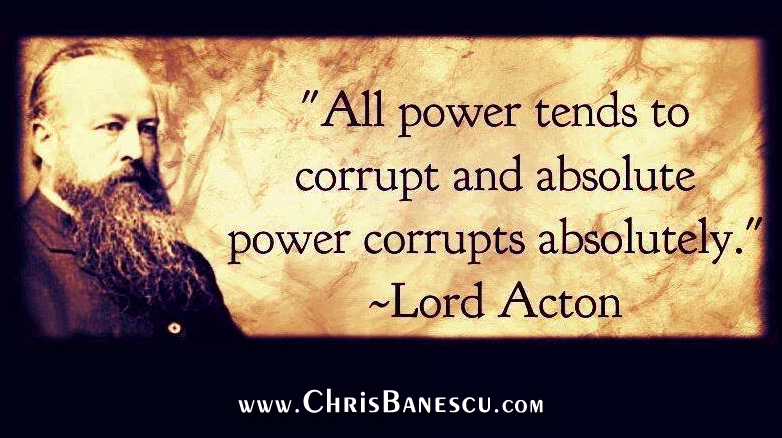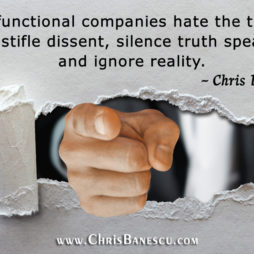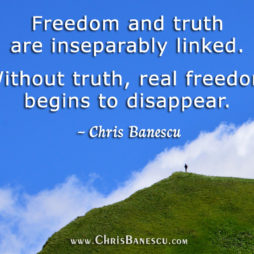 by Chris Banescu –
by Chris Banescu –
Power tends to corrupt, and absolute power corrupts absolutely. Great men are almost always bad men, even when they exercise influence and not authority: still more when you superadd the tendency or certainty of corruption by full authority. There is no worse heresy than the fact that the office sanctifies the holder of it. – Lord Acton
Lord Acton’s dictum, made in 1887, clearly warns us that the practice of wielding power and influence can corrode the character of leaders. History is replete with examples of individuals who wielded unchecked power and eroded not only their own integrity, but also the ethical and moral foundations of the organizations they led and brought them to catastrophe and ruin. This danger is true of all organizations including businesses, religious institutions, and governments.
Here is the risk inherent in leadership: The greater the leader’s power, wealth, authority, and influence, the more likely the leader could succumb to ethical lapses and moral failings. The risk increases if the organization has a culture that lacks financial or managerial transparency and accountability, has insufficient checks and balances on executive power, and discourages criticism from subordinates or members. When a leader with a poorly developed ethical or moral sense ends up leading an organization with a culture that prevents ethical self-examination, a slow but perfect storm starts to form that demands compromise from all levels of leadership and eventually leads to catastrophic consequences.
There are various warning signs that can indicate whether a company, religious organization, or government institution is headed by leaders who are susceptible or have already surrendered to the corrupting influence of unchecked power. Obvious situations to watch out for include:
You can’t handle the truth! Management defends the lack of accountability and transparency in financial issues and other administration processes and refuses independent audits or the establishment of proper checks and balances. Requests to increase organizational transparency are met with claims that openness and full disclosure would undermine or even destroy the organization. The leaders responsible frequently resort to secrecy, delays, denials, stonewalling, and refusal to acknowledge or answer questions, anything to stall the release of information and implementation of any meaningful and independent oversight over their power and control.
Ignore the message but shoot the messenger. Leaders actively work to silence, marginalize, ostracize, or fire employees who raise red flags, ask pertinent questions, challenge unethical or inconsistent management practices, or insist on more transparency and accountability in the organization.
Dehumanize your opponents. Superiors and their cronies often launch into personal attacks, besmirch the character of critics, and demonize anyone who stands up to unlawful authority, dubious conduct, or abuses observed. The status, position, background, and/or motivation of the questioners become the attacker’s sole focus, while the reality of the situation and the truth of the inquiries are dismissed. Enablers call into question not only the legitimacy of the person, but also their humanity.
How dare you! The leader’s status, position, education, past accomplishments, wealth, “good” intentions, generosity, personal likeability, fund raising ability, or superior intellect are used as arguments to challenge any subordinate’s right to ask questions, request justifications, or seek explanations from senior leadership.
All employees are equal but some employees are more equal than others. Leaders encourage and apply arbitrary, subjective, and inconsistent enforcement of organizational policies (if any actually exist) that benefit only those that show unquestioning loyalty and full obedience to superiors. These compliant members are praised, rewarded, and promoted, regardless of their lack of skills and capabilities, and the little value they bring to the actual long-term health and prosperity of the organization.
The buck never got here! The truth and reality of institutional situations are continually adjusted to suit the “official” version of events. Management incompetence, organizational losses and problems, and leadership fiascoes are frequently re-defined to shift the blame away from those actually responsible. Often fate, mysterious forces, unnamed parties, unfortunate circumstances, bad luck, outside consultants, or recently fired employees are blamed for the actual problems.
The emperor has no clothes. Character flaws and unethical actions of top leaders gradually become qualities and failures become successes. Failure to admit mistakes, acknowledge personal fault, apologize for missteps, listen to criticism, and take corrective action are portrayed as evidence of the leader’s strength and determination.
Evil is good, and good is evil. Employees who show courage, ethics, and integrity and fearlessly speak out are called troublemakers and boat-rockers. Courageous and ethical individuals are denounced as “insubordinate” or “dangerous” for refusing to compromise their principles and daring to challenge their superiors. In contrast, compliant and cowardly employees who maintain their silence, support the status quo, and show unquestioning loyalty and obedience to the leader’s power structure are continually praised and showcased as model citizens.
Seeing these flaws in leaders, whether they are company executives, religious figures, politicians, and others can be demotivating and disturbing for people who presume that integrity matters and minimal standards of ethical decision-making are in place at work. This is especially true in organizations where ethical and moral decisions should be central to their mission such as religious institutions, healthcare organizations, and any organizations that have significant influence over the well-being of individuals.
Encountering these signs in your institution is unsettling enough. Worse still, being persecuted by these abusive leaders for daring to speak the truth and standing for ethics often leads to a sense of alienation, estrangement, and abandonment. These issues are seldom addressed until the corruption is revealed for all to see and courageous leaders take corrective action.




